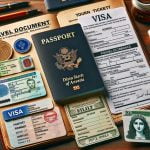What documents needed to travel to Italy? Planning a trip to Italy involves more than just booking flights and accommodations. Understanding the travel requirements for Italy is essential to ensure a smooth and hassle-free journey. From passport and visa requirements to important considerations such as travel insurance and COVID-19 restrictions, this article will guide you through the necessary documents needed for your trip to Italy.
Before embarking on your Italian adventure, it’s crucial to ensure that you have the right documentation in place. This includes having a valid passport, understanding whether a visa is required, and being aware of any additional documents such as health declaration forms or proof of accommodation.
In this comprehensive guide, we will explore each aspect of the travel requirements for Italy, offering insight into what you need to know before you go. So sit back, relax, and let us help you navigate the necessary documentation needed for your upcoming trip to Italy.
Passport Requirements
When traveling to Italy, one of the most important documents you will need is a valid passport. Your passport serves as your primary form of identification and proof of citizenship when entering a foreign country. It is crucial to ensure that your passport meets the requirements set by the Italian government to avoid any issues upon arrival.
Passport Validity
Before traveling to Italy, it is essential to check the expiration date on your passport. The Italian government requires that your passport be valid for at least three months beyond your intended departure date from the Schengen area. It is always advisable to renew your passport if it has less than six months’ validity remaining to avoid any complications during your trip.
Visa Requirements for Passport Holders
As a United States citizen, you are allowed to travel to Italy and other Schengen countries for up to 90 days without a visa for tourism or business purposes. However, if you plan to stay longer than 90 days or for reasons other than tourism or business, you will need to apply for an appropriate visa. It is important to check with the Italian consulate or embassy in your area regarding specific visa requirements based on your travel plans.
Important Reminders
When preparing for your trip, make sure that there are empty pages in your passport for entry and exit stamps in Italy. Additionally, carry a photocopy of the personal information page of your passport separately from the original document during your travels as a precautionary measure.
Overall, having a valid passport and understanding the specific requirements set by the Italian government is crucial when planning a trip to Italy. Ensuring that you have all the necessary documents will help create a smooth and hassle-free travel experience as you explore all that this beautiful country has to offer.
Visa Requirements
When planning a trip to Italy, one of the most important aspects to consider is whether or not you need a visa to enter the country. The visa requirements for Italy vary depending on your nationality and the purpose of your visit. It is crucial to understand the visa regulations to ensure a smooth and hassle-free travel experience.
Understanding Schengen Visa
Italy is part of the Schengen Area, which allows visitors to travel between 26 European countries without border controls. If you are a citizen of a country that is not exempt from the Schengen visa requirement, you will need to obtain a Schengen visa in order to travel to Italy.
Exemptions and Visa-Free Travel
Some nationalities are exempt from obtaining a Schengen visa for short stays in Italy. This includes citizens of certain countries that have visa waiver agreements with the Schengen Area. Additionally, travelers who hold residence permits or visas from other Schengen countries may be allowed entry into Italy without needing an additional visa.
Long-Term Stay Visas
For those planning to stay in Italy for longer periods, such as for work, study, or family reunification, it may be necessary to apply for a different type of visa. Long-term stay visas have their own set of requirements and application processes, so it is important to research and prepare accordingly.
It is essential to thoroughly research the specific visa requirements for your situation before traveling to Italy. Consulting with the Italian embassy or consulate in your home country can provide valuable guidance on what documents needed to travel to Italy and how best to fulfill the visa requirements.
Travel Insurance
When planning a trip to Italy, one of the most important things to consider is travel insurance. Whether you are traveling for business or pleasure, having the right travel insurance can provide peace of mind and financial protection in case of unexpected events. Travel insurance can cover a wide range of situations including medical emergencies, trip cancellations, lost luggage, and more. It is essential to carefully review the coverage options and select a policy that best fits your travel needs.
In addition to providing financial protection, some countries, including Italy, require visitors to have travel insurance as a mandatory entry requirement. This is especially important during the ongoing COVID-19 pandemic as many countries are enforcing strict health regulations for travelers. Having adequate travel insurance can help meet these requirements and ensure a smoother entry process into Italy.
Moreover, purchasing travel insurance before your trip to Italy can also offer coverage for any unforeseen changes in your travel plans. Whether it’s a missed flight connection or an unexpected illness while abroad, having the right policy in place can alleviate stress and minimize potential financial burdens. It’s important to understand what documents needed to travel to Italy include having valid travel insurance and ensuring you have sufficient coverage for the duration of your stay.
Lastly, when researching and purchasing travel insurance for Italy, be sure to read through the policy details carefully and ask questions if you are unsure about any exclusions or limitations. By doing so, you can make an informed decision and enjoy a worry-free experience while exploring all that Italy has to offer.
| Document Required | Description |
|---|---|
| Valid Passport | A passport that is valid for at least six months beyond your planned departure from Italy. |
| Travel Insurance | Adequate coverage including medical emergencies and trip cancellations. |
| Proof of Accommodation | A hotel reservation or proof of other accommodations during your stay in Italy. |
COVID-19 Travel Restrictions
Italy, like many countries around the world, has implemented travel restrictions in response to the COVID-19 pandemic. As a traveler, it is crucial to stay informed about these restrictions to ensure a smooth and hassle-free trip to Italy. Before planning your visit, it is important to check the latest updates on travel restrictions and requirements.
As of now, travelers from certain countries may be required to present a negative COVID-19 test result upon arrival in Italy. Additionally, there may be specific quarantine requirements for travelers arriving from high-risk areas. It is essential to keep abreast of the latest travel advisories and entry requirements issued by the Italian government and health authorities.
In addition to COVID-19 related travel restrictions, it is also advisable to have the necessary documents readily available before traveling to Italy. This includes a valid passport, any required visas, proof of accommodation, and other important paperwork.
| Document | Requirement |
|---|---|
| Passport | Must be valid for at least 3 months beyond your planned date of departure |
| Visa (if applicable) | Dependent on your nationality and length of stay in Italy |
| Negative COVID-19 Test Result | May be required for travelers from certain countries |
By staying informed about current travel restrictions due to the pandemic and ensuring you have all the necessary documents prepared, you can help make your journey to Italy as seamless as possible. Keeping an eye on official sources for updates will allow you to adjust your plans accordingly and have an enjoyable experience in this beautiful country.
Additional Documents
When traveling to Italy, it’s essential to not only have a valid passport and any necessary visas but also to be aware of any additional documents that may be required for your trip. In addition to the standard travel documents, there are a few other important items you should have in order to ensure a smooth and hassle-free experience during your time in Italy.
One important document you may need is a health declaration form. This form typically asks about your recent travel history, any symptoms you may be experiencing, and your contact information. It’s crucial to fill out this form accurately and honestly as it may be used for contact tracing purposes or by Italian authorities for public health reasons.
Another essential document to have is proof of accommodation. Whether you’re staying at a hotel, Airbnb, or with friends or family, having documentation of where you’ll be staying during your time in Italy is important. This can be in the form of a hotel reservation confirmation, a letter of invitation if staying with friends or family, or an address and contact information if staying at an Airbnb.
It’s always a good idea to check the specific requirements for documents needed to travel to Italy based on your nationality and individual circumstances. Some travelers may also need additional documentation such as a return flight ticket, proof of sufficient funds for their stay, or even a travel itinerary. Doing thorough research ahead of time will help ensure that you have all the necessary documents for your trip to Italy.
Tips for Smooth Travel
Traveling to Italy can be an exciting and enriching experience, but it’s important to ensure that you have all the necessary documents to make your trip go smoothly. In addition to your passport and possibly a visa, there are a few other documents you may need to have on hand when traveling to Italy. Here are some tips for ensuring a hassle-free travel experience:
Tip 1: Health Declaration Form
When traveling to Italy, especially in light of the ongoing COVID-19 pandemic, you may be required to fill out a health declaration form. This form typically asks for information about any recent travel history, current health status, and contact information. It’s important to fill out this form accurately and honestly before your arrival in Italy.
Tip 2: Proof of Accommodation
It’s also advisable to have proof of accommodation ready for presentation upon arrival in Italy. This could be a confirmation from your hotel or rental property, or even just an address where you will be staying during your visit. Having this documentation readily available can help expedite the immigration process upon entry into the country.
Tip 3: Travel Insurance Information
While not always required for entry into Italy, having travel insurance can provide peace of mind during your trip. Travel insurance can help cover unexpected medical expenses, trip cancellations, lost luggage, and more. It’s a good idea to have all relevant policy information easily accessible during your travels in case it’s needed.
By being prepared with all the necessary documents for travel to Italy, including some additional ones that may be required due to current circumstances such as the COVID-19 pandemic, you can help ensure that your trip goes off without a hitch. Whether it’s filling out health declaration forms or having proof of accommodation readily available, taking these extra steps can go a long way in providing you with peace of mind while visiting this beautiful country.
Conclusion
In conclusion, it is evident that having the right documents is crucial for a successful trip to Italy. From ensuring that your passport is valid to understanding if you need a visa, the importance of these documents cannot be overstated. Travel insurance and staying informed about COVID-19 travel restrictions are also vital components of your travel preparations. In addition, it’s important to remember any additional documents needed, such as a health declaration form or proof of accommodation.
Having the correct documentation not only ensures compliance with Italian immigration requirements but also contributes to a smooth and hassle-free travel experience. It helps in avoiding any unnecessary disruptions or complications that may arise during your trip. By being proactive and organized in gathering all necessary documents, you can set yourself up for an enjoyable and stress-free journey to Italy.
Frequently Asked Questions
What Documents Do I Need to Enter Italy?
To enter Italy, you typically need a valid passport that does not expire for at least three months beyond your planned departure from the Schengen area. If you are a non-EU citizen, you may also need a visa depending on your country of origin.
Do I Need Proof of Funds to Travel to Italy?
Yes, as a visitor to Italy, you may be asked to provide proof of sufficient funds to cover your stay. This can include bank statements, traveler’s checks, or a letter from the person sponsoring your trip. The amount required can vary based on the length of your stay and other factors.
What Documents Are Needed for Tourist Visa in Italy?
The documents required for a tourist visa in Italy often include a completed application form, passport-sized photos, a valid passport, round-trip travel reservation or itinerary, proof of accommodation bookings, travel insurance, and evidence of financial means to cover the stay. Additional documents may be required based on individual circumstances.

I’m a passionate traveler, writer, and Italophile. My fascination with Italy’s history, art, and culture has led me on countless adventures across the Italian landscape. Through “I Live Italy,” I share my love for this extraordinary country and aims to inspire others to explore its boundless beauty.





